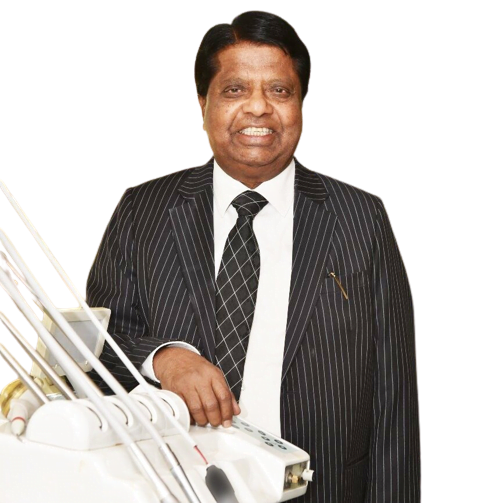Getting hurt during any form of sports is no big deal. However, having a sports-related dental injury is never fun. And if it’s a knocked-out tooth, it calls for a medical emergency. Rather, a knocked-out tooth or an ‘avulsed’ tooth is one of the most serious dental emergencies one can experience for permanent teeth.
The good news is that the damage can be FIXED. Wondering how? If you act quickly, knocked out tooth or teeth can not only be reinserted into the tooth socket but also they can be saved for you to enjoy the benefits of natural teeth and thus salvaging your SMILE. Interestingly, only permanent teeth can be re-implanted.
Be it an assault or an accident or sports injury the cause may be any for a knocked-out tooth. If the tooth is not broken in pieces, it is always better to try saving it. Knowing what to do and how to handle this dental emergency can help increase the chances of saving the tooth.
“The odds of saving a tooth in young children as well as in adults are high if the timely action is taken and the tooth is re-inserted or stored properly.
Timely Action
While trying to save the knocked out tooth, the most important thing is to ACT swiftly and immediately.
As happened with 11-year-old Prayag (name changed) who had suffered a tooth injury while playing football. Following the impact of a fall or a ball-hit, both his front teeth had come out of the socket. “This young boy had come with teeth out of the socket due following a sports injury. We were able to replant the same teeth into the socket and give him back his smile. Here, the best thing happened was that the boy’s family ACTED FAST and got him to us with his broken tooth,” says Dr. Vikas Gowd, dental implant expert at Dr. Gowd’s Dental Hospitals.
“Time is an important factor for the survival of the tooth. In fact, the first 30-60 minutes after the tooth is knocked out are critical. The sooner it is re-implanted, the higher are the chances of success,” Dr. Gowd says.
The survival rate is good if the tooth has been stored properly.
What To Do
But do you know what to do when your tooth takes a temporary vacation from your mouth?
“A lot of people are unaware or have no idea if such knocked out teeth can be brought back to us safely, we can fix them back,” adds Dr. Vikas Gowd.
Although the best option is to get to the dentist as quickly as possible, people need to understand what should be done before coming to the dentist.
Following below tips can boost the chances of saving the tooth:
Keep the patient calm.
Handling the tooth:
- Find the tooth. When you retrieve the tooth, carefully pick up the tooth or tooth fragments only by its crown (the top part of the tooth).
- Handle and hold the tooth carefully by the chewing surface area.
- Never touch its roots to avoid more damaging to the tooth. The damage to the root may prevent re-implantation.
Cleaning the tooth:
- If the tooth is visibly soiled or dirty, hold it by the crown and gently rinse it under running water or milk.
- You can even gently place it in lukewarm water in a bowl for not more than 10 seconds to cleanse the dirt.
- Do not scrub the tooth or use any soap, chemical or toothpaste to remove dirt.
- Also, not to try to dry it off, or wipe it off or store it in tissue, cloth or other fabric as this could damage the tooth.
Control bleeding with a cloth and rinse the mouth with lukewarm water.
Re-insert or store the tooth:
- The best place for storing your tooth is in your mouth under the tongue.
- If possible try to encourage the patient to replant the tooth back into the socket immediately. Else, assist the patient to gently slip it back into the socket as you head for the emergency help to the dentist.
- But whoever is doing it, they need to be sure that they don’t compress the tissues or gum part hard or for a long time. This may damage the tissues.
- Bite on a handkerchief to hold the teeth in position.
- Using your own saliva can also help keep the tooth alive.
Transporting the tooth
- If the teeth can’t be reinserted, rush immediately to the dentist and ensure to take the tooth or tooth fragments along with you.
- Sometimes the patient may not be conscious, then put it in normal saline water or alternatively they can put it in milk and get it.
- Allowing the tooth to dry out can damage the root. It’s important to keep the tooth moist.
- Till the time you reach the emergency help, either put the tooth back in the mouth between the cheek and gum or store it in milk to prevent drying.
- Sometimes what happens is this kind of injury can happen during the night or during a stay in a hotel or a resort far off where the dentist might not be available for an emergency or they may not be accessible. What they need to do is put it in saline or put it in ice to preserve the tissues because they can’t keep it under the tongue for so long.
It is most important to re-implant the tooth as soon as possible. Obtain dental care immediately. You may be able to save the tooth if you can see the dentist within the first few hours.
“The patient came back on time within an hour of the injury with his teeth in water and cotton,” says Dr. Vikas.
AT THE DENTIST
The first thing dentist would do is to check for the correct positioning of the tooth, if the tooth has been reinserted before coming to the doctor. “In the young boy’s scenario, since he had got two knocked-out teeth and that he had got the teeth, they were immobilized with splinting: a procedure where the tooth/teeth are stuck to adjacent teeth with wires and tooth color filling material. Splinting temporarily attaches the tooth to keep it intact,” says Dr. Vikas.
The important thing after the procedure which needs to be ensured is that once the tooth is put back into the socket, it should not be moved. So to avoid that situation and accelerate the recovery, we immobilize the tooth.
After the splinting, it is then to be seen if the tooth is being accepted by the body. In 2-3 weeks of time, if the teeth become rigid, it would mean that the body has accepted the change.
“Once the teeth become rigid, we remove the splint. Normally it takes 3-4 weeks but in some case, it may take a bit longer as well,” Dr. Vikas says.
Thereafter, the dentist checks for the vitality of the teeth and thereafter suggest a root canal surgery accordingly, which is common in such sports-related dental injuries.
“Typically, the tooth becomes like a normal tooth in terms of functioning and we also tend to crown the teeth as in the young boy’s case as there was also a fracture in the teeth,” he adds.
The best part is that the success rate in such scenarios has been as high as 90%.
“Young patients (who had got their knocked-out teeth back) and their parents keep coming back to us even after 10-15 years expressing their surprise and thanks to that we kind of got them their teeth back,” Dr. Vikas says.
But there also may come a time in over 10-15 years that sometimes the tooth starts getting dissolved from inside that hinting that the body is starting to reject the tooth and then an alternative has to be looked into.
But the success rate has been higher in most of the cases and the teeth have stayed for like 10-15 years and sometimes longer.
Please note…
If you cannot find your knocked-out tooth or you have broken your tooth in fragments, it is still essential to have the patient see the dentist as soon as possible.
As long as the above-listed instructions are followed and taken care of, one can experience recovery within 3-4 weeks. Losing a tooth might be painful and if it happens, rush to Dr. Gowd’s Dental Hospital for an emergency.






